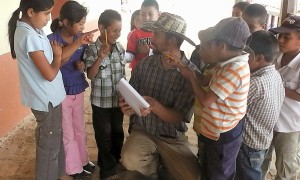
Andrew Robertson, PE, an engineer with Souder Miller & Associates in Albuquerque, has been volunteering with WEFTA for more than a decade. He has a special affection for Honduras and has made numerous trips and raised funds for projects there. In April 2015, Andrew and his wife Karen Pereira—also a WEFTA volunteer whom Andrew met while volunteering with us—toured several projects that are completed or nearing completion and which received significant support from long-term friends at American Chemistry Council, Chlorine Division (CCC) and The Vinyl Institute (VI). Here, Andrew shares some thoughts on why WEFTA works and why he keeps going back to help again and again.
When you see the joy in people’s faces the first time they get water for their families and hear the pride in their voices when they say they built this water pipeline themselves, that’s what makes it all worthwhile. Someday when I have grandkids and they ask me what I’ve seen in my life, that’s what I want to tell them about.
The reason this work is so satisfying for me as a volunteer is because it really is sustainable. We know that the projects we build and the impact on the communities and the health of their children are going to last for decades, because the community members are motivated and trained to take care of them. That’s why it’s worth all the time, money, and effort.
This past trip, one of the village elders said the community considers me to be their son. How can you not want to help a community like that?
WEFTA’s main goal is sustainability. It does no good to build a water system that stops working in 10 year because it’s too expensive to maintain, because the community never received training how to take care of it, or because the community members were never personally invested in the project to begin with.
- WEFTA’s projects in Honduras require 50‐60% of the material cost and 100% of the volunteer labor to be provided by the communities themselves. The cost share ensures the communities are invested and have incentive to take care of the water systems for the long‐ term. It also ensures that projects remain simple and inexpensive – both to construct and to maintain in the future.
- Because the community members themselves actually build the pipelines, they will also know how to fix them when needed.
- In addition, WEFTA conducts at least annual inspections on all past projects to make sure they are being maintained and working properly.
WEFTA projects use only inexpensive, locally‐available materials like PVC that are easy for community members to transport, install, and maintain. In Monquecagua, the residents had to carry all the pipes by hand almost 3 miles uphill through dense jungle, so having pipes that are light enough to carry on your shoulder and strong enough not to break if you accidentally drop one is really important!
All WEFTA projects include chlorinators using solid chlorine pellets or powder. Solid chlorine is safe, easy to use, and effective. WEFTA also makes sure each community’s operator is trained in water chlorination and follows up after the project is in service to make sure the water is being properly chlorinated. As a result, communities have reported that their children are much healthier and miss fewer days of school due to water‐borne diseases.



